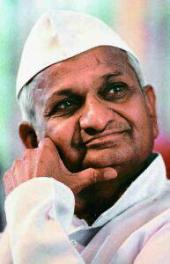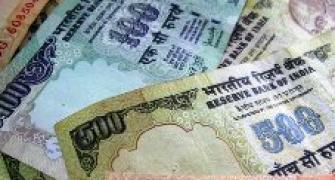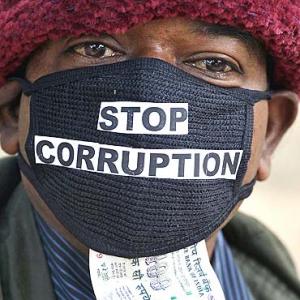It is important for corruption to be rooted out, but a slow decision-making process can be an even bigger price for the country to pay, says A K Bhattacharya.  The Anna Hazare movement leading to the formation of a joint committee to frame an effective Lok Pal Bill is likely to have one major consequence for senior civil servants.
The Anna Hazare movement leading to the formation of a joint committee to frame an effective Lok Pal Bill is likely to have one major consequence for senior civil servants.
Many of them may now become even more reluctant to take decisions.
The belief among several government officials is that if you do not take decisions you are unlikely to make mistakes.
The tribe of such officers may grow after the Hazare movement.
Recent court orders forcing the disclosure of government officials' comments on a file under the Right To Information Act have already made these officials ultra cautious.
This is the sense one gets after talking to senior officials in central ministries.
Now that they know their comments on a file could become public, officers are more inclined to add all possible caveats to any endorsement of a proposal.
The caveats are essentially there to help the officer save his skin if the decision becomes controversial.
Such caveats may or may not always be desirable, but what they do achieve is a slow decision-making process.
The tendency now is not stick your neck out, but defer a decision for as long as you can.
It is important for corruption to be rooted out, but a slow decision-making process can be an even bigger price for the country to pay.
Thus, civil servants in different bhavans in New Delhi are busy assessing the impact of the RTI Act and the Hazare movement on their general conduct and the way they do their work.
To be sure, a large number of officials are in favour of putting in place a system to root out corruption.
But they feel that the institutionalisation of such checks and balances in the system through the RTI Act or the Lok Pal is not enough.
Civil servants need governance reforms in large doses if the RTI Act and the proposed institution of the Lok Pal were to be effective instruments for cleansing the system.
For instance, the government needs to amend the laws that define corruption by civil servants.
Technically, the Prevention of Corruption Act can hold every public servant guilty of corruption if any decision he takes benefits a private person.
The clauses in the law are such that anyone can use it against any civil servant who may have taken any decision that might have led to a private person's financial benefit.
While an RTI Act with more teeth and a Lok Pal Bill are good ideas, the government
Secondly, there is need to consider seriously the proposal made by the government's chief economic advisor, Kaushik Basu, that the laws on corruption should make a distinction between 'harassment bribes' and 'systemic bribes'.
Harassment bribes are those that ordinary citizens pay to an officer for getting a legitimate service delivered. For instance, many Indians would have paid some bribe to acquire a driving licence.
That is a harassment bribe. If he does not pay it, then he will get his driving licence, but only after an inordinately delay.
Basu's proposal is that the law enforcement agencies should not treat a bribe-giver in such cases as an offender, so that there is an incentive for such a bribe-giver to spill the beans and authorities to take remedial action.
It is only for 'systemic bribes', when bribes are meant to bend the system and gain financial favours, that both bribe-givers and bribe-takers should be treated as offenders.
In the campaign against corruption, such amendments in the laws should receive the government's priority attention.
Thirdly, the government should move quickly on its digitisation programme.
The interface between all government departments providing services and ordinary citizens should be a computer screen and not an officer.
Such digitisation has taken place in many government departments, but the human face has not completely disappeared.
Getting a passport, paying the annual tax or obtaining a driving licence have all become simpler with the use of computerised services.
However, the use of technology in all these areas remains limited and the government officers still come in between the citizen and the service-providing department.
Finally, it is time that the government beefed up its law enforcement agencies to send out the message loud and clear that rule-breakers will have no escape route.
The prevailing idea among most civil servants is that you can flout the rules and get away scot-free.
In the battle against corruption, better governance, digitisation and stringent law enforcement are all critical instruments.
Image: Anna Hazare









